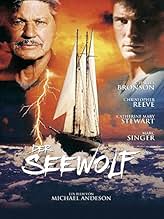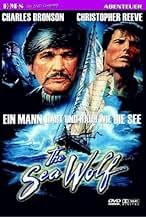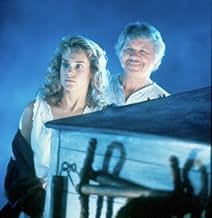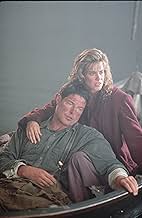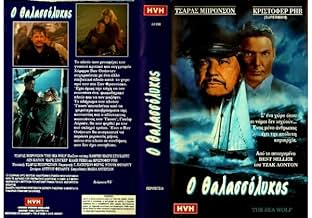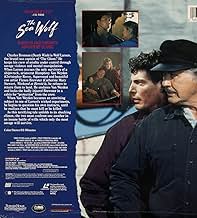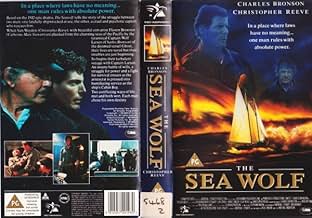NOTE IMDb
6,0/10
1,1 k
MA NOTE
Ajouter une intrigue dans votre langueJack London's brutal Wolf Larson brings a shipwrecked aristocrat and a con woman aboard his doomed ship, the Ghost.Jack London's brutal Wolf Larson brings a shipwrecked aristocrat and a con woman aboard his doomed ship, the Ghost.Jack London's brutal Wolf Larson brings a shipwrecked aristocrat and a con woman aboard his doomed ship, the Ghost.
- Réalisation
- Scénario
- Casting principal
- Nommé pour 1 Primetime Emmy
- 1 nomination au total
Russell Roberts
- French Frank
- (as Russell J. Roberts)
Avis à la une
The film narrates how a cocky young (Christopher Reeve) and a beautiful girl (Catherine Mary Stewart) are shipwrecked and picked up by a ship called ¨the Ghost¨commanded by captain Larsen (Charles Bronson) , a ruthless but clever seaman , reader of Shakesphere , Nietzsche , Darwin and Milton (The lost time). The couple become themselves in accidental passengers confronting wits and taking on brutal sailors (Clive Revell) and only helped by an alcoholic doctor (Len Cariou) and a good seaman (Mark Singer).
The picture is a fine television adaptation of the famous homonymous novel by Jack London scripted by Andrew J. Fenady (producer too , along with Ted Turner). The film has intelligent character studio , showing on the various main-support roles and stunningly playing the tale . Thus , Charles Bronson is magnificent as the obstinate and brutal captain who's really obsessed to track down his brother . One of the few times Charles Bronson performed a villainous person since he became a top international star in the early 70's , at the time he generally played vigilantes in Michael Winner and J. L. Thompson films . Christopher Reeve (recently deceased) as his contender with too much wishes to escape is splendid . Catherine Mary Stewart is enjoyable and enticing . Special mention for secondary cast, Len Cariou as the kind boozy doctor is excellent and Clive Revell as the nasty cook who mistreats to Reeve is outstanding. The black and white classic version novel is the greatest and was directed by Michael Curtiz in 1941 with Edward G. Robinson (Larsen), Alexander Knox (Reeve's role), Ida Lupino (Catherine Stewart's role) and John Garfield (Singer's role). The flick will appeal to seafaring adventure genre enthusiasts and of course Bronson and Reeve fans. Rating : 6.5/10 . Well worthwhile seeing.
The picture is a fine television adaptation of the famous homonymous novel by Jack London scripted by Andrew J. Fenady (producer too , along with Ted Turner). The film has intelligent character studio , showing on the various main-support roles and stunningly playing the tale . Thus , Charles Bronson is magnificent as the obstinate and brutal captain who's really obsessed to track down his brother . One of the few times Charles Bronson performed a villainous person since he became a top international star in the early 70's , at the time he generally played vigilantes in Michael Winner and J. L. Thompson films . Christopher Reeve (recently deceased) as his contender with too much wishes to escape is splendid . Catherine Mary Stewart is enjoyable and enticing . Special mention for secondary cast, Len Cariou as the kind boozy doctor is excellent and Clive Revell as the nasty cook who mistreats to Reeve is outstanding. The black and white classic version novel is the greatest and was directed by Michael Curtiz in 1941 with Edward G. Robinson (Larsen), Alexander Knox (Reeve's role), Ida Lupino (Catherine Stewart's role) and John Garfield (Singer's role). The flick will appeal to seafaring adventure genre enthusiasts and of course Bronson and Reeve fans. Rating : 6.5/10 . Well worthwhile seeing.
For those who saw the black and white version of 1941 starred by E.G. Robinson, John Garfield and Ida Lupino, this remake is far away to be of the same quality as this one. Bronson is never at the altitude of Robinson, he is a kind of soft Wolf while Robinson played a real tough one. Reeve tried to be at the same level of Garfield, but again unsuccessfully. This remake is only better in its photography and colors, but the cast of 1941 version acted simply masterfully.
Coming in during the later years, this was another one to tick off from actor Charles Bronson's long-winding filmography. "The Sea Wolf" (which is based on the novel by Jack London and has quite a few film adaptations before it) is a very good made for television ocean adventure enterprise, which relies on the strong performances of Bronson and Christopher Reeve. It's their characters and a battle of wills between them not to give in that makes it quite interesting, but at the same time gripping with their chats on philosophy. There's admiration, but also detest. Reeve is credibly tuned in as wealthy gentleman Humphrey Van Weydan who finds himself at the mercy of the cold-blooded, madman captain Wolf Larsen, a hardy but complicated portrayal by Bronson. For Wolf its amusing watching Humps (his ship nickname) trying to adapt to the conditions
because he's out of his comfort zone
being civilised doesn't work and what it comes down to is primal instinct. The sea has no laws. Learn or die. Which Wolf believes Humps would soon turn to, because he likes to say I told so
but Humps remains determined not to give in too easily. Wolf is a tyrant as he seems to use everybody on board as pieces for his own enjoyment, which leads to treachery and his own demise.
Aristocrat Humphrey Van Weydan and Flaxen Brewster are survivors of a ferry shipwreck, which are plucked out of the ocean by Wolf Larsen, a skipper of a seal-hunting ship. Wolf won't turn back for land, despite the lady Flaxen not being in good shape. Humphrey learns that his stuck on a ship with a psychotic skipper, but tries his best to keep a level-head throughout the voyage.
Director Michael Anderson's ("Around the world in 80 days", "Logan's Run" and "Orca") compact handing suit's the film's low scale, where obvious set-pieces are constructed around its simple, but assured narrative. At times it looks cheap and stagy, but it's competently pulled off with moments of taut suspense and stinging acts of brutality. Andrew J. Fenady's teleplay adaptation bestows an enthralling literate script with well drawn up characters, fascinating viewpoints and psychological banter. Sometimes it got a little bogged down, during the growing affection between the characters Humphrey and Flaxen and the waterlogged conclusion is not as strong as it could've been. Still its well judge, and liked how it keeps a dark undertone to it namely that of Bronson's tough, intimidating performance. The cast also features Catherine Mary Stewart, Marc Singer, Len Cariou and a perfectly weasel-turn by Clive Revill.
Aristocrat Humphrey Van Weydan and Flaxen Brewster are survivors of a ferry shipwreck, which are plucked out of the ocean by Wolf Larsen, a skipper of a seal-hunting ship. Wolf won't turn back for land, despite the lady Flaxen not being in good shape. Humphrey learns that his stuck on a ship with a psychotic skipper, but tries his best to keep a level-head throughout the voyage.
Director Michael Anderson's ("Around the world in 80 days", "Logan's Run" and "Orca") compact handing suit's the film's low scale, where obvious set-pieces are constructed around its simple, but assured narrative. At times it looks cheap and stagy, but it's competently pulled off with moments of taut suspense and stinging acts of brutality. Andrew J. Fenady's teleplay adaptation bestows an enthralling literate script with well drawn up characters, fascinating viewpoints and psychological banter. Sometimes it got a little bogged down, during the growing affection between the characters Humphrey and Flaxen and the waterlogged conclusion is not as strong as it could've been. Still its well judge, and liked how it keeps a dark undertone to it namely that of Bronson's tough, intimidating performance. The cast also features Catherine Mary Stewart, Marc Singer, Len Cariou and a perfectly weasel-turn by Clive Revill.
This movie does Jack London's sailing yarn Sea Wolf real justice for an average budget attempt.
One thing that strikes me is how far away we are from the history of the sea in our modern world, and how great London's writing really is in this story, weaving the rawest tenets of human struggle into what was then one of the primary economic engines of the world, the commerce of the ocean-going fishing, whaling, or here, sealing ship. Of course, the sea tale is such a romantic notion, ironic in that it was so tough to actually live, and offers a writer so much because the characters are all stuck together in a constant state of peril from without, and this magnifies the sense of the peril between them.
Reeve is brilliant as an educated man of position facing the rawest of worlds far from where he was raised. He runs into another intellectual of sorts, a captain who has scrambled from poverty to occupy a position of pure power, which he holds in purely Machiavellian ways. Reeve's true sensitivity comes out in the role, acting as foil to the pure cynicism of Bronson's Captain Larsen, begging for mercy for others and for good when possible. I kept being struck at how strong, virile, and yet kind and warm Reeve seemed in the role, and the strength he would need as his own life took such an awful turn not long after this movie.
Bronson also gets his licks in as a man who has seen empathy repaid with betrayal so many times, he sees empathy only as weakness and vulnerability, and considering his surroundings, he makes an excellent case. The story sets these two forces, two approaches to life against each other, and basically never resolves them, which is good, because a resolution would be too facile. Both men stick to who they are. There are times when Bronson seems less than on, but his previous persona lends itself well here, lending him the previous strength, but I can tell he approached the role in a different way than his other tough guy roles. He created a real weakness in the rigidity of this character and conveys a fairly broken man who still knows how to be a brutal and effective leader. He isn't a wisecracker, here though. He's a weakening man in a tough shell. Bronson is past his peak here, but still rivets the viewer, especially a fan. I would've pegged Bronson for 60 here, but he was 70 when he made this film.
THe supporting cast runs the gamut from great to average, with a couple given exceptional moment in London's story. I enjoyed seeing two actors 20+ years later, now both gone. They really were both great.
One thing that strikes me is how far away we are from the history of the sea in our modern world, and how great London's writing really is in this story, weaving the rawest tenets of human struggle into what was then one of the primary economic engines of the world, the commerce of the ocean-going fishing, whaling, or here, sealing ship. Of course, the sea tale is such a romantic notion, ironic in that it was so tough to actually live, and offers a writer so much because the characters are all stuck together in a constant state of peril from without, and this magnifies the sense of the peril between them.
Reeve is brilliant as an educated man of position facing the rawest of worlds far from where he was raised. He runs into another intellectual of sorts, a captain who has scrambled from poverty to occupy a position of pure power, which he holds in purely Machiavellian ways. Reeve's true sensitivity comes out in the role, acting as foil to the pure cynicism of Bronson's Captain Larsen, begging for mercy for others and for good when possible. I kept being struck at how strong, virile, and yet kind and warm Reeve seemed in the role, and the strength he would need as his own life took such an awful turn not long after this movie.
Bronson also gets his licks in as a man who has seen empathy repaid with betrayal so many times, he sees empathy only as weakness and vulnerability, and considering his surroundings, he makes an excellent case. The story sets these two forces, two approaches to life against each other, and basically never resolves them, which is good, because a resolution would be too facile. Both men stick to who they are. There are times when Bronson seems less than on, but his previous persona lends itself well here, lending him the previous strength, but I can tell he approached the role in a different way than his other tough guy roles. He created a real weakness in the rigidity of this character and conveys a fairly broken man who still knows how to be a brutal and effective leader. He isn't a wisecracker, here though. He's a weakening man in a tough shell. Bronson is past his peak here, but still rivets the viewer, especially a fan. I would've pegged Bronson for 60 here, but he was 70 when he made this film.
THe supporting cast runs the gamut from great to average, with a couple given exceptional moment in London's story. I enjoyed seeing two actors 20+ years later, now both gone. They really were both great.
Le saviez-vous
- AnecdotesOne of the few times Charles Bronson played a villain since he became a top international star in the early 70's. He generally did not like playing villains and turned down many roles in his later years where he would play one.
- Citations
Dr. Picard: There's not much I can do.
Capt. Wolf Larsen: You could sober up.
Dr. Picard: I'm afraid she's not going to survive.
Capt. Wolf Larsen: You say that about all your patients.
- ConnexionsEdited from Le vaisseau fantôme (1941)
Meilleurs choix
Connectez-vous pour évaluer et suivre la liste de favoris afin de recevoir des recommandations personnalisées
Détails
- Date de sortie
- Pays d’origine
- Langue
- Aussi connu sous le nom de
- Deniz Kurdu
- Lieux de tournage
- Sociétés de production
- Voir plus de crédits d'entreprise sur IMDbPro
- Durée1 heure 30 minutes
- Couleur
- Rapport de forme
- 1.33 : 1
Contribuer à cette page
Suggérer une modification ou ajouter du contenu manquant

Lacune principale
By what name was Le loup de mer (1993) officially released in Canada in English?
Répondre
